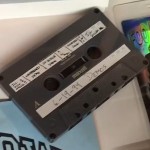Session Information
Following the death of Kurt Cobain and resulting demise of Nirvana in April 1994, Dave Grohl felt lost. Grieving the loss of his friend, Grohl was unsure of where he wanted to go next in life, what his future held. “After Kurt's death, I was about as confused as I've ever been. To continue almost seemed in vain,” Grohl believed. “I was always going to be 'that guy from Kurt Cobain's band' and I knew that. I wasn't even sure if I had the desire to make music anymore.” In the immediate weeks following Cobain’s passing the drummer couldn’t even stomach listening to music, never mind make it, but his outlook was soon brightened by a simple yet powerful message of support among the many condolences he would receive.
One morning a letter dropped through Dave’s post-box. The letter was from the members of fellow Seattle rockers 7 Year Bitch, an all-female band who had also suffered similar tragedies. “We know what you're going through,” the letter began. “The desire to play music is gone for now, but it will return. Don't worry.” On June 27th, 1992 guitarist and co-founder of the band Stefanie Sargent returned home from a party, having consumed alcohol and taken a small amount of heroin. Sargent passed out on her back and as a result of vomiting without waking, died of asphyxiation, aged just 24. 7 Year Bitch made the hard decision to carry on with a new guitarist but just over a year later suffered yet more heartache. Mia Zapata, frontwoman of The Gits and very close friend of the band, was brutally raped and murdered as she returned home from a bar in Seattle.
“That fucking letter saved my life,” remarked Grohl. “As much as I missed Kurt, and as much as I felt so lost, I knew that there was only one thing that I was truly cut out to do and that was music. I know that sounds so incredibly corny, but I honestly felt that.”
Buoyed on by the message of support Grohl made several public appearances in the summer of 1994, including a performance with The Backbeat Band at the annual MTV Movie Awards. More significantly, he would also start writing new songs again, the first time since Kurt’s death. There was still no ultimate goal, but the first step was to do what he’d done for almost a decade previous – visit Laundry Room Studio and record the new ideas with his friend Barrett Jones. Visiting the studio in mid-June 1994 five new songs were recorded for the first time - ‘I’ll Stick Around’, ‘Wattershed’, ‘Oh, George’, ‘X-Static’ and ‘This Is A Call’. With years of experience working together, the pair had “a good system down” by this point according to Jones, and recording was fast, an entire song laid down within an hour.
“I had these ideas in my head and just went into the studio and did it,” said Grohl of the session. There was apprehension before the first playback of the song ‘I’ll Stick Around’, Dave unsure of himself, if the music he’d written in an entirely new frame of mind was any good. After a few listens he was more positive, happy with what he’d produced. “I thought like wow, that's the kind of song that I'd always wanted to write but I was either too scared lyrically to express myself, or I was too afraid to have such a kind of bonehead, like a hard rocking riff or something. So after I finished it I thought 'wow, I'd actually accomplished what I was trying to do for a really long time.” Barrett had also observed a difference in Grohl’s writing with this song, noting that he “tried inventing a cool bass line, trying something different on the bass than guitar” as he’d always previously done.
For many years after its eventual release, Grohl would be asked about the subject matter of the song, with many journalists speculating that it was about Kurt Cobain’s widow Courtney Love, linking the lyrics to Grohl’s possible feeling towards her at the time - “I don’t owe you anything”. For over a decade Grohl would brush off the questions, giving vague answers and straight up denials, but in 2010 he finally confirmed what most suspected – “I've denied this for 15 years but yes, it’s about her,” he told journalist Paul Brannigan.
With five more songs committed to tape Grohl had now recorded over 30 different songs or ideas over the previous 6 years and had a decision to make on what he was to do with them. Less than a week later however Barrett Jones would inadvertently put the first piece of the ‘Foo Fighters’ puzzle in place. Jones visited the local Seattle radio station 99.9 FM KISW, as he would regularly, to give airtime and promotion to some of the artists he had recorded. One of those artists on this occasion was Dave Grohl.
Jones joined DJ Damon Stewart on his ‘New Music’ show and started out by playing a song by up and coming local band Monkey Finger before Stewart then prompted him on to talk about some of the higher profile acts he’d worked with. “My friend Dave, from back East, joined this band Nirvana and I had the pleasure of recording a couple of songs for them,” Barrett joked, before playing one of the songs he’d recorded, ‘Oh, The Guilt’.
More bands were aired before the conversation turned back to Grohl. Jones explained that he had recorded new material with him the previous week and gave a glowing review of his skills, noting that he recorded all the music by himself and that he “gets everything on the first take”.
Jones cued up ‘I’ll Stick Around’ although at this time he noted that the song didn’t have a title; instead, Grohl had given it a symbol, one which resembled that of cymbal producer Zildjian.
Whether he realized it or not, this combination of a public airing and by specifically giving the song to Damon Stewart, Barrett Jones had set the wheels in motion. The reason Stewart was so key came with his other job – as well as being a DJ, he also worked in the A&R department for Sony Music and he naturally saw huge value in the new music from the former Nirvana drummer.
Stewart took the tape along to Sony and it also soon got around to other labels, with word of mouth about it soon spreading. Within days Grohl was bombarded with phone calls from various parties, all broadly asking the same thing – “What are you going to do?” Still unsure, Grohl consulted his manager John Silva and lawyer Jill Berliner for advice. “Do you have a band? Are you going to make a record?” they asked. Grohl didn’t have a band, but he did make a decision on the other question and formed a plan, or at least the first part of one. “[I’m going to] book a week in a 24-track studio, choose the best stuff [I’ve] ever written out of the thirty or forty songs that [have] piled up, and really concentrate on them in a real studio.”


